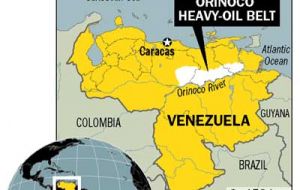MercoPress. South Atlantic News Agency
Chavez completes re-nationalization of oil reserves
 The Orinoco region has more than 55,000 square kilometers
The Orinoco region has more than 55,000 square kilometers Venezuela took control of the Orinoco oil installations on May first completing the process of “re-nationalization” of the nation's oil reserves. President Hugo Chávez led celebrations of the takeover of the Orinoco Oil Belt which could convert Venezuela into the country with the largest oil reserves.
"Welcome to the new PDVSA (Venezuela's state oil company)," said Rafael Ramírez on Monday night. "Here we begin the real petroleum nationalization." Ramírez spoke at a symbolic event at an oil complex in Anzoátegui state which was broadcast across the nation on all national airwaves. During the event, celebrating the take over of the Orinoco Oil Belt, employees of the state oil company PDVSA changed their traditional blue helmets used in the facilities until now for new red helmets, signifying solidarity with the Bolivarian Revolution. "The existing oil reserves in all national territoryâ€Ã‚¦belong to the republic and are goods of the public domain," said Ramírez. "Venezuela is exercising its right to administer its natural resources for the benefit of the people." Starting May 1st, PDVSA controls a minimum 60% of the shares in all oil operations in the Orinoco river basin. So far four joint companies have been formed with multinational companies including Total, Sincor, Chevron Texaco, ExxonMobil, British Petroleum and the German company Veba Oel. Conoco Phillips is the only company with operations in the Orinoco that has not yet signed an agreement with the Venezuelan state oil company. President Chávez also spoke before a huge crowd of PDVSA employees on Tuesday, in the Industrial Complex José Antonio Anzoátegui, in the state of Anzoátegui. According to official sources, more than 40,000 people were present at the event to celebrate the Venezuelan state takeover of the installations on May 1st, International Workers' Day. "Finally, today we have buried the 10 years of petroleum opening," said Chávez, referring to the "opening" of the industry to privatization in the 1990's. Yesterday's events marked the continuation of the re-nationalization politics of the Chávez government, one of his original proposals when he was elected in 1998. During the 1990's the Venezuelan economy was increasingly opened to privatization, including the state-owned oil industry. Chávez promised to put a stop to this and to reclaim the national sovereignty over the oil industry. "Imperialism dominated our basic industry, our energy resources and our natural resources for a long time. That is over today," said Chávez. "Today is the end of that time when all our natural resources always ended up in the hands of anyone but the Venezuelan people." The foreign oil companies will now play a smaller role in the operations in the Orinoco Oil Belt. Most of the foreign companies have already signed agreements to migrate to new joint operations with PDVSA, which will redefine the participation of the foreign companies in the region. Venezuela's PDVSA, in turn, will have to step up their operations to meet the high technology requirements. The oil found in the Orinoco Oil Belt is heavy and extra heavy crude oil, which requires a complex process of extraction. PDVSA President Rafael Ramírez assured that Venezuela has the technological capacity and personnel necessary for the task. He also stated that the government plans to make new investments to continue the expansion of the sector. The Orinoco region has more than 55,000 square kilometers of oil resources which will give the Venezuelan state the control of an additional 600,000 barrels of oil per day. Venezuela currently produces 3.3 million barrels of oil per day, according to official figures. By 2008, the Venezuela government hopes to certify that the Orinoco contains around 270 billion barrels of extractable oil with the use of modern technology. With that certification, Venezuela would have around 316 billion barrels of total reserves, placing it above Saudi Arabia as the country with the world's largest oil reserves.




Top Comments
Disclaimer & comment rulesCommenting for this story is now closed.
If you have a Facebook account, become a fan and comment on our Facebook Page!